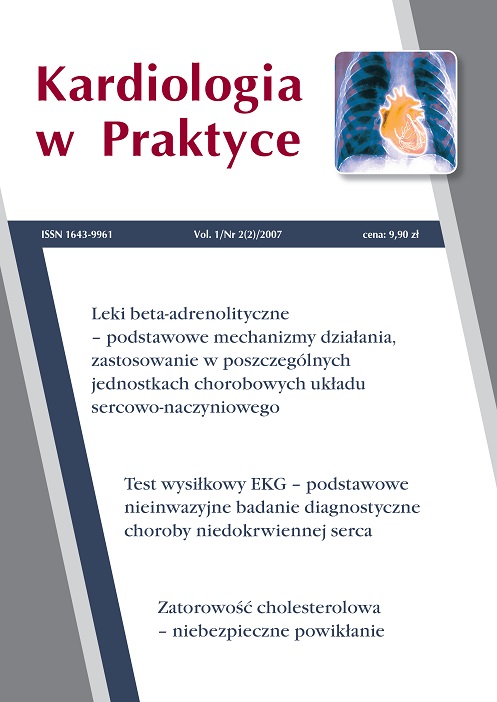Leki beta-adrenolityczne – miejsce we współczesnej kardiologii Artykuł przeglądowy
##plugins.themes.bootstrap3.article.main##
Abstrakt
Leki β-adrenolityczne to jedna z najważniejszych grup leków we współczesnej kardiologii. Artykuł omawia podstawowe mechanizmy działania leków oraz ich zastosowanie w poszczególnych jednostkach chorobowych układu sercowo-naczyniowego.
Pobrania
##plugins.themes.bootstrap3.article.details##

Utwór dostępny jest na licencji Creative Commons Uznanie autorstwa – Użycie niekomercyjne – Bez utworów zależnych 4.0 Międzynarodowe.
Copyright: © Medical Education sp. z o.o. This is an Open Access article distributed under the terms of the Attribution-NonCommercial 4.0 International (CC BY-NC 4.0). License (https://creativecommons.org/licenses/by-nc/4.0/), allowing third parties to copy and redistribute the material in any medium or format and to remix, transform, and build upon the material, provided the original work is properly cited and states its license.
Address reprint requests to: Medical Education, Marcin Kuźma (marcin.kuzma@mededu.pl)
Bibliografia
2. Dubiel J.S., Heba G.: Leki β-adrenolityczne w leczeniu stabilnej choroby wieńcowej. W: Leki β-adrenolityczne w choroba ch układu sercowo-naczyniowego. Grodzicki T., Januszewicz A., Opolski G. (red.) Via Medica 2004.
3. Expert consensus document on beta-adrenergic receptor blockers. The Task Force on Beta-Blockers of the European society of cardiology. Task Force Members, Jose Lopez-Sendon, Karl Swedberg, John McMurray et al. Eur Heart J 2004, 25: 1341-1362.
4. Filipiak K.J., Grabowski M., Opolski G.: Farmakologia kliniczna leków β-adrenolitycznych. W: Leki β-adrenolityczne w chorobach układu sercowo-naczyniowego. Grodzicki T., Januszewicz A., Opolski G. (red.) Via Medica 2004.
5. Frishman W.H.: Multifactorial actions of beta-adrenergic-blocking drugs in ischemic heart disease: current concepts. Circulation 1983, 67 (suppl. I): 11-8.
6. Freemantle N., Cleland J., Young J. et al.: Beta-blockade after myocardial infarction: systematic review and meta regression analysis. BMJ 1999, 318: 1730-1737.
7. Yusuf S., Lessem J., Pet J. et al.: Primary and secondary prevention of myocardial infarction and strokes. An update of randomly allocated controlled trials. J Hypertens 1993, 11 (suppl. 4): 61-S73.
8. Harjai K.J., Stone G.W., Boura J. et al.: Effects of prior beta-blocker therapy on clinical outcomes after primary coronary angioplasty for acute myocardial infarction. Am J Cardiol 2003, 91: 655-60.
9. Gottlieb S., McCarter R., Vogel R. et al.: Effect of beta-blockade on mortality among high risk patients after myocardial infarction. National Cooperative Cardiovascular Project. N Engl J Med 1998, 338: 489-97.
10. Yusuf S., Witte J., Friedman L.: Overview of results of randomized trials in heart disease: unstable angina, heart failure, primary prevention with aspirin and risk factor modifications. JAMA 1988, 260: 2259-63.
11. ACC/ AHA 2002 guideline update for management of patients with unstable angina and non-ST-segment elevation myocardial infarction: a report of the American College of cardiology/ American Heart Association Task force on Practice Guidelines (Committee on Management of Patients With Unstable Angina).
11a. Sznajderman M.: Brytyjskie wytyczne postępowania w nadciśnieniu tętniczym – aktualizacja 2006. Med Prakt 2006.
12. The Seventh Report of the Joint National Committee on Prevention, Dtection, Evaluation and Treatment of High Blood Pressure. The JNC 7 Report. JAMA 2003, 289: 2560-2575.
13. MERIT-HF study group. Effect of metoprolol CR/ XL in chronic heart failure. Metoprolol CR/ XL randomised intervention trial in congestive heart failure (MERIT-HF). Lancet 1999, 353: 2001- 7.
14. CIBIS-II investigators and committees. The cardiac insufficiency bisoprolol Study II (CIBIS-II): a randomised trial. Lancet 1999, 353: 9-13.
15. Carvedilol Prospective Randomized Cumulative Survival (COPERNICUS) Study Group. Effect of carvedilol on the morbidity of patients with severe chronic failure: results of the carvediliol prospective randomized cumulative survival (COPERNICUS) study. Circulation 2002, 106: 2194- 2199.
16. Dargie H.J., Colucci Y., Ford I. et al.: Effect of Carvedilol on outcome after myocardial infarction in patients with left-ventricular dysfunction: the CAPRICORN randomised trial. Lancet 2001, 357: 1385-1390.
17. McMurray J., Kober L., Robertson M. et al.: Antiarrhythmic Effect of Carvedilol After Acute Myocardial Infarction Results of the Carvedilol Post-Infarct Survival Control in Left Ventricular Dysfunction (CAPRICORN) Trial. J Am Coll Cardiol. 2005, 45: 525-530.
18. Syska-Sumińska J. Kuch M.: Beta-adrenolityki w niewydolności serca. W: Farmakologia Kliniczna. Dłużniewski M., Mamcarz A., Krzyżak P. (red.) Wydawnictwo AM 2002.
19. Haas S.J., Vos T., Gilbert R.E. et al.: Are beta-blockers as efficacious in patients with diabetes mellitus as in patients without diabetes mellitus who have chronic heart failure? A meta-analysis of large scale clinical trials. Am. Heart J. 2003, 146: 848-53.
20. Malmberg K.: Prospective randomised study of intensive insulin treatment on long term survival after acute myocardial infarction in patients with diabetes mellitus. DIGAMI study group. BMJ 1997, 314: 1512-5.
21. Filipiak K.J., Marchel M., Kownacki Ł.: Aktualne standardy farmakoterapii stabilnej choroby wieńcowej – implikacje ostatnio opublikowanych zaleceń. Standary Med 2004, 17 (suppl): 99-107.
22. Opolski G., Filipiak K.J., Poloński L.: Ostre zespoły wieńcowe. Wydawnictwo Urban&Partner, Wrocław 2002.
23. Rdzanek A., Wilczyńska J., Rdzanek H.: Pacjent po PCI – postępowanie terapeutyczne w opiece ambulatoryjnej. Standardy Med. 2004, 17 (supl.): 68-80.
